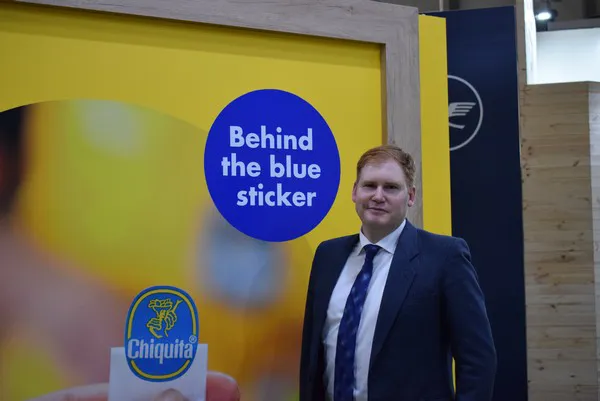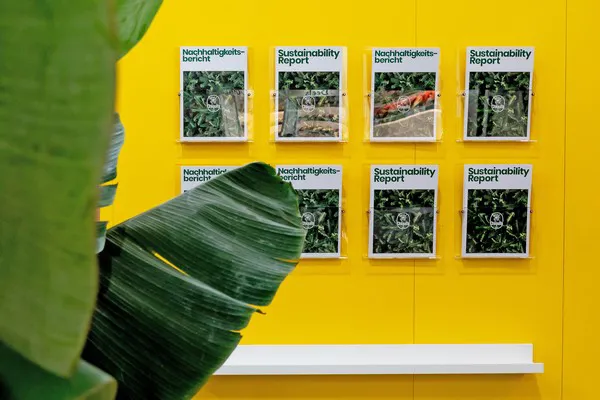“Chiquita has a long term sustainability strategy,” says Peter Stedman, Chiquita sustainability advisor. “One that is deeply embedded in the business.” It is why the 2019 sustainability report does not deviate a lot from the 2017 one.
Peter explains that many elements are very familiar and he thinks that this is a good thing. “It is only over time that a business can demonstrate impact.” He indicates that Chiquita believes in embedding sustainability. “There is no point in doing a project and then leaving it on the shelf. So we are innovating and make that part of our ongoing Behind the Blue Sticker approach.” Part of that approach are also the triple certifications that apply to the Chiquita farms: Rainforest Alliance, SA 8000 and GlobalG.A.P. as an organic certification for organic bananas. “We don’t want to put all three of them on our bananas. It would give a messy banana. It’s all behind the Blue Sticker. The importance is that people start to recognize and understand that the Blue Sticker stands for sustainable production.“
That goes for social responsibility too. “We think that our approach reaps rewards and provides benefits for the society and the environment.” Peter points out that Rainforest Alliance and SA8000 as well as Fair Trade are all members of the Global Living Wage Coalition striving towards giving workers a decent standard of living with each having their own ways of achieving that.
“We use Rainforest Alliance and SA8000, so we are committed to a process of working towards living wages. Our wages are freely negotiated with worker representative organisations. A mature social dialogue is what is going to mean working towards more sustainable living wages for workers across the industry.”
Peter observes that consumers are becoming more aware and are expecting more of retailers, businesses in general and brands in terms of sustainability and social responsibility. “We have always embodied those values and now we are using the Blue Sticker to communicate that.” Peter expresses the hope that customers recognise brands that are doing a better job investing in sustainability and retailers will reward them with more business.

25 per cent yield increase
In fact, ‘Behind the Blue Sticker’ is a strategic vision. One of its elements is a focus on their own operations; the farmers’ code. “We have undergone a regeneration process. Currently 56 percent of our land has been completely regenerated. This is a massive process of change which is about getting the most out of the farms.”
The programme involves improving land and soil, switching banana varieties, increasing the amount of plants grown in an area and planting cover crops. Chiquita calls the rejuvenating programme an essential part of improving the way the bananas are produced sustainably. The aim is to increase yield by 25 percent by making the most of existing land instead of planting new areas.
“There will be 10 billion people in 2050. If we are going to feed them, the world as a whole has to increase agricultural productivity by 40 percent. And this is us setting our agricultural productivity and strategy for the next 30 years.” Chiquita has gathered all current knowledge and set the farms up in the best possible way to produce the most bananas within a natural system. Peter indicates that in this process cues are taken from the natural system itself. The natural forest plays a role in that, containing natural predators which prevent pests attacking the bananas. It leads to an integrated crop management where agro-chemicals are only used when pests pose a risk to the crop. From 2014 to 2017, Chiquita reduced the amount of agro-chemicals used by 13 percent per hectare. “This is achieving more with less. This is farming for the future with an eye not only on future needs, but also on sustainability by ensuring that we are not destroying the natural environment while maximising the productivity potential of the farm.”
Science based target
Peter calls the climatological extremes that are increasingly occurring an absolute reality. He observes that there is less well distributed rain and that there are more intense dry periods. “We see the effects differently in different places but we are confident that overall banana production will continue to thrive.” That this may involve a shift in production areas is quite probable according to Peter. “But, being very geographically spread is a benefit for us. We will experience it in different ways, some positive and some negative. The most important thing is that we make sure that we are doing our bit globally to meet the challenge of climate change.“
It is one of Chiquita’s goals to be one of the first agricultural organisations to make a science based target commitment. Science based targets provide companies with a clearly defined pathway to future-proof growth by specifying how much and how quickly they need to reduce their greenhouse-gas emissions for a temperature change no greater than 1.5ºC. The Science Based Targets initiative is partnered with several organisations among whom the United Nations Global Impact and the World Wide Fund for Nature. “It is the government’s responsibility to protect and it is the businesses’ responsibility to respect. We have been given this clear guide and as a responsible business we must respect this and work out how we can meet that trajectory.”

Enabling
Like to every company that is active in the world of bananas, TR4 is a concern to Chiquita. Peter indicates that there are 400 million people in 135 countries that rely on bananas as a staple food or a source of income. “We have a responsibility outside of our trade to ensure that TR4 will not send millions of people into poverty and starvation.”
Chiquita believes the whole industry has a responsibility to act and hosted the world’s first international forum of global experts on the banana disease in 2017. “Chiquita’s funding is part of an ongoing commitment to be a good global citizen and enable others to fight TR4.” Chiquita sees itself as an enabler in this matter, helping the experts to find a solution. “The important thing is that whatever solution is out there is in the public domain and really is available to everybody. This is about millions and millions of people continuing to have employment and having food to eat.” (MW)
Children first
Chiquita became the first banana company to undertake a Child’s Rights Impact Assessment (CRIA). “It is designed by Unicef and the organisation Article One did an assessment on 14 Chiquita farms in Panama and Costa Rica.” Evidently no children are working on the farms, Peter explains. But Article One has also been focusing on the communities surrounding the farms.
“We believe we have a responsibility to understand any direct or indirect impact we may have. Because we really believe that childhood is the most important moment in life. Somebody’s life expectancy and their ability to earn money is set within the first few years of life. It is statistically proven that good nutrition and good education are what makes the difference. But that is statistics. The reality is that we can have a positive impact upon the children who live in the communities around our farms by looking at our own practises.”
Article One reported that no evidence of child labour at Chiquita farms in either country was found. Also Article One found that the working conditions of the parents have a significant impact on the well-being of their children. Therefore, much of the recommendations are geared towards that goal. Peter explains that the assessment yielded examples of what Chiquita does to protect child’s rights like protecting women’s rights in maternity and also identified areas that can be strengthened with very practical suggestions like making transport and lighting available after dark so that young people can attend evening classes.
“The first thing we do is to make sure that the learnings from those 14 farms are taken everywhere else.” Chiquita is now looking into the situation in Honduras and Guatemala to see if the situation is different there.
For more information:
Chiquita
Email: info@chiquita.com
